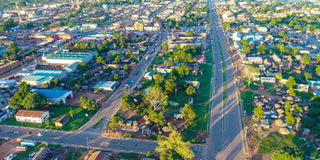What new cities mean for the real estate sector

An aerial view of Gulu, one of towns that will become cities effective July 1. PHOTO/COURTESY
What you need to know:
- When an area is declared a city, what we expect is always beyond the usual
Recently, the government of Uganda declared seven new towns that will acquire city status by July 1, 2020, among these include Arua, Gulu, Jinja, Mbarara, Fort Portal, Mbale and Masaka.
In these new places declared for city status, what do we look forward to?
When an area is declared a city, what we expect is always beyond the usual. Cities have always provided a home for new ideas, and will always pioneer the next wave of great ideas for urban real estate growth.
When we talk of a new city, we simply assert that people are going to be attracted to come work, invest, live and stay in these places. Others will actually make them their permanent places of abode. As is the case for Kampala where millions of people have left other parts of the country to come and permanently settle here, a similar trend is about to befall our newly declared cities, people will move from Nebbi, Kyenjojo, Pakwach etc to go and settle in the new cities to establish a livelihood.
A new city comes with many opportunities, especially for real estate, cities primarily depend on infrastructure like roads, houses, office blocks, commercial buildings and other amenities.
To any real estate developer, any city needs shopping malls, arcades, apartments, small housing units, schools, hospitals and for those into construction, the share is equally the same because all these need to be constructed. With a desire by the government to make roads and other infrastructure better in a city, bidding for road construction and maintenance comes as a golden opportunity. The government will also come with a high demand for office and other administration blocks for various city authorities.

A view of the proposed Mbale City. Photo by Rachel Mabala
Property value
We are going to be prepared to see an increase in value and general prices for property within the city boundaries but also the surrounding areas immediately outside the city, actually, this is already happening, Sources in Hoima, Fort Portal and other areas reveal the price surge. Land and other property in these areas is already picking up in prices, with a lot of speculation at play now. This will definitely mean an emerging real estate market for plots of land for people entering these cities to work and settle there, apartments for those that work within but just wish to rent, Hotel business will definitely thrive as a result of business men that come to transact or close deals within just a few days and return to their original destinations Another fertile ground is what we call industrial complexes at the outskirts of the city. These can include warehouses and other storage facilities. This is because much business is about to engulf these cities and traders will need places to store their goods for some time before the supply chain takes place.
Fort Portal
A more detailed watch out for Fort Portal is something that real estate investors cannot stand to miss. As we all know, fort portal is already a hub because of its enormous tourist attractions. These married with a city status will definitely prove nothing but more business, especially for developers in hotel structures, Apartments, motels and other luxurious housing developments. Note that Fort Portal has what we call a transient population. Something else for Fort Portal that most Ugandans have not embraced is what we call vacation rentals, especially for people that go to fort portal for a vacation of one week or even more, probably close to a month, such a person might not want to opt for a Hotel but rather a vacation rental.

Rogers Matovu is a real estate lecturer.
On a lighter scale, as cities emerge, there is a possibility of fewer move-aways by people that might not be able to afford life in a city especially high standards and costs of living. This exposes many structures by those people on to the market for sale as people that cannot afford the city leave. We can call this evaporation of the low income class.
Furthermore, as a city grows, building codes and standards are set by planning authorities, those that cannot afford to meet the standards will either dispose off or partner with those investors that can uplift the status of such structures. The sure thing is that the native low income earners that cannot uplift their small buildings are going to sell them off.
Upsurge of human activity
The major foundation to the possible real estate opportunities lays upon the background that there is going to be an assured upsurge of human activity and settlement in the new cities. It is also true that more jobs will definitely be created, which will scale up peoples incomes and consequently the capacity to buy real estate. Now, where jobs and population growth are booming, the opportunities and growth for real estate is always a foregone conclusion With many advantages, disadvantages are also always at a distance watching. Cities are always faced with too much pressure from human settlement. There is always an upsurge and conglomeration of people in city centres and particularly a fast and high population growth as because of migration from rural areas, as a result, the risk of densification, urban sprawl, congestion, pollution and slum growth. If the planning authorities do not watch out, we shall witness deterioration, deficiencies in modern basic facilities, and general urban decay and we might end up with cities having Kampala characteristics.




